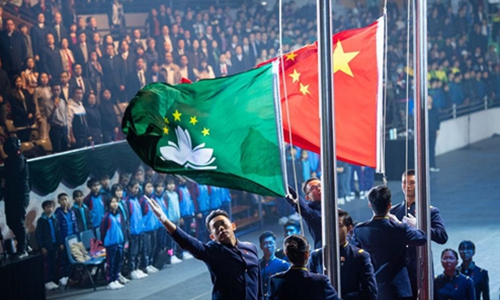HOME >> OPINION,SPECIAL-COVERAGE
Macao’s devt lesson for Hong Kong
Source:Global Times Published: 2019/12/17 22:03:42

Students are raising China's national flag and the flag of the Macao Special Administrative Region (SAR) in an activity to celebrate the 20th anniversary of Macao's return to the motherland in Macao, south China, December 6, 2019. Photo: Xinhua
As the 20th anniversary of Macao's return to China approaches, the city, which is low key compared to neighboring Hong Kong, has recently been in the spotlight of world public opinion. In contrast to Hong Kong, Macao has shown a totally different scene under the "one country, two systems" principle. There is constant economic growth in the city rather than political turmoil, endless street movements, and violent protests. Macao' GDP in 2018 was eight times that of 20 years ago, with its per capita GDP ranking second-highest in the world.Its return to China has reshaped Macao's economy. Before 1999, the city's per capita GDP was only about half of Hong Kong's, but now the two cities have switched positions. It is believed people are willing to live in a highly developed economy, where there are more opportunities for individuals.
Being small was not the only reason Macao was overlooked by Western media. The city has precisely implemented the "one country, two systems" principle, ensuring the perfect collaboration between the central government's rule and the city's high degree of autonomy. In contrast, some US political elites have called the violent protests in Hong Kong "a beautiful sight."
The prosperity and development of Macao has proven the feasibility of the "one country, two systems" principle. And the unrest in Hong Kong has further proven that the Macao practice of the principle is the only feasible way.
The Chinese central government doesn't aim to constrain the special administrative region (SAR)'s high degree of autonomy, but rather keep it from being politically distorted and used by foreign forces to create conflicts between the "two systems."
As China rises, the US-led Western forces increasingly intend to intervene in China's affairs. The SARs could be the easiest target for them. The SARs adopt capitalism and have common interests and values with Western societies. This is the SARs' advantage in bridging China and the West and also a chance for foreign forces to check China.
As early as 2009, Macao passed the legislation of article 23 of the Basic Law concerning national security. The region's education sector also boasts a group of teachers that are faithful to the country. Patriotic customs such as national flag-raising have become systematized in all schools of Macao. All these have squeezed room of external forces to use Macao as leverage to target China.
As a result, Macao has the advantages of sustainable development with central government's backing and is immune to malicious Western forces.
Many patriotic people in Hong Kong also hope to dispel political disturbances and implement the "one country, two systems" principle so as to focus on development. There are many British and American cultural elements in Hong Kong's culture, which, under political stability, can better make the region a merger of Chinese and Western values and interests. Nonetheless, political motivations of some Western forces have intruded into the city, and thus twisted and jeopardized Hong Kong's development.
The radical forces in Hong Kong have been brainwashed by the US and the West and they are rendering Hong Kong as a lever the West could use against China. Hong Kong could supposedly gain development momentum from both the mainland and the West given its special status, but is unfortunately turned into a battlefield between China and the West. This can only be exploited by the few political opportunists in Hong Kong, while most residents suffer.
If more Hongkongers can reflect on the region's development from Macao's experience, it will be beneficial to the future of Hong Kong.
Posted in: EDITORIAL,FEATURE 2